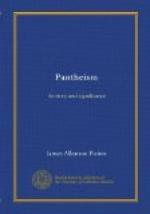[Footnote 15: It is not within the scope of the present essay to give a life of Barach (or Benedict) de Spinoza. But for the sake of those to whom the work of Sir Frederick Pollock is not easily accessible, the following particulars may be given. Spinoza was born in Amsterdam, November, 1632, of a fairly prosperous Jewish family, originally from Portugal. He received thorough instruction in the language and literature of the Hebrews, and in addition became a good Latin scholar, so far as to write and correspond in that language. He was early interested in philosophy, and especially attracted for a time by the writings of Descartes. By the time he was twenty-three years old he was suspected of heresy, and in his twenty-fourth year (1655) was cut off from the Synagogue with a frightful curse. His family disowned him, and for his maintenance he turned to the polishing of lenses, a trade already learned in accordance with the Jewish custom that every boy must have a handicraft. What he earned would hardly be considered a “living wage” in these days. But according to Colerus, his first biographer, who enquired of the householders with whom Spinoza lodged, his day’s maintenance of often cost no more than 4-1/2_d_. Various incidents proved his total indifference to money, except as far as needed to “provide things honest in the sight of all men.” Though of an amiable and sociable disposition he lived a solitary life, while not indisposed to kindly talk with his humbler neighbours. He had some of the greatest scholars of the day among his correspondents. He published but little during his life, leaving his greatest work as a legacy to the world on his early death, at the Hague, from consumption, in 1677.]
[Footnote 16: “It is to be observed that, inasmuch as Attribute is defined by reference to intellect, and Thought itself is an attribute, Thought appears to be in a manner, counted twice over.”—Spinoza: His Life and Philosophy, by Sir Frederick Pollock. Second edition, 1899, p. 153.]
[Footnote 17: It is of course true that Spinoza considered himself to have a clear and adequate conception of God. But by this he meant only that, as a philosopher, he had an intuitive certainty of eternal and infinite Being. So have all of us humbler mortals, though we should not have been able to express it for ourselves. No one supposes that for an indefinite space of time or eternity there was nothing, and then suddenly there was something. But, if not, then everyone recognises with Spinoza the fact of eternal Being, though, of course, he saw what this recognition meant, as the many do not. But when it comes to the facts of mortal imperfections and ignorance, Spinoza, with his theory of “inadequate ideas,” is as ready as Spencer to acknowledge the Unknowable.]
[Footnote 18: I do not think it necessary in an essay of this kind to discuss Spinoza’s theory of the body as object of the mind, and the mind as “idea” of the body, both being different aspects of the same thing.]




